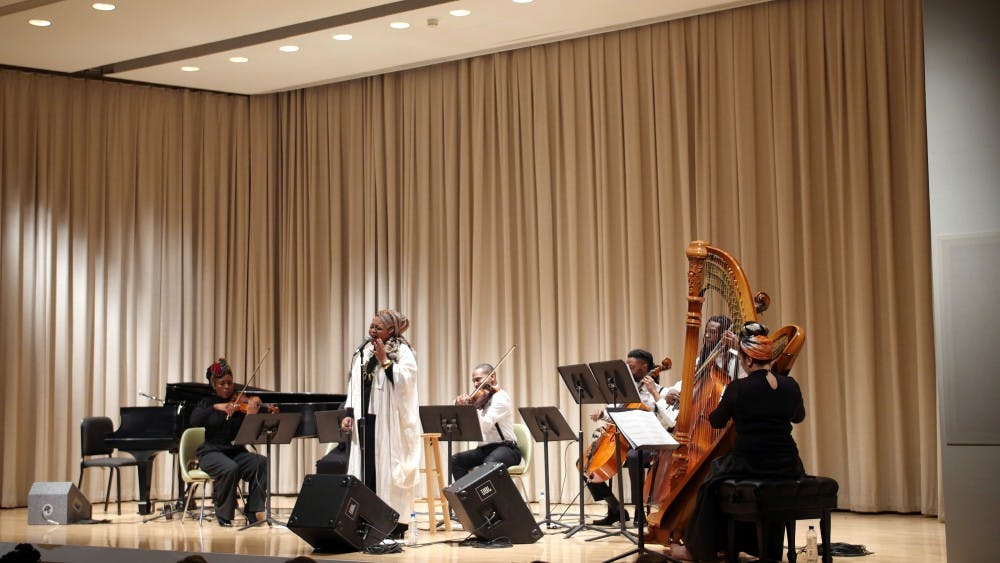An intense performance of “Strange Fruit” filled Albright-Knox with a sense of poignancy on Thursday night, as Drea d'Nur and Roostock Republic made Nina Simone’s music feel just as relevant as Simone herself did in the 1960s.
The musicians collaborated on March 8 at the Albright-Knox Art Gallery for the premiere of d'Nur and Juliette Jones’ latest production “Dear Nina: a Sonic Love Letter to Nina Simone”.
The performers covered some of Simone’s canonical works through vocals from d’Nur and a classically-trained six-piece string ensemble, Roostock Republic. The ensemble featured founder of Rootstock Republic and principal violinist Juliette Jones, violinist Monique Brooks-Roberts, violinist Jarvis Benson, cellist Malcolm Parson, bassist Chris Johnson and Riza Printup on harp.
“Dear Nina” is based on d’Nur’s presentation “The Spirit of Nina,” which sold-out Kleinhans Music Hall in February and July of 2017.
“Strange Fruit” was among the most impressive of the twelve songs the outfit performed. The song began with a solo by Jones and then progressed to d’Nur on piano.
Jessica Hutchison, an interpretive dancer dressed in an antebellum-era outfit, made a striking appearance during the song. Her movement matched the lyrics and music as the dance took on the feeling of a physical, or possibly societal, struggle.
Sonya Rice, a 1997 UB alum, was thrilled with the performance.
“[The performance was] absolutely powerful. The feelings that I have right now, so much emotion, so much love and so much gratitude. … It encapsulates Nina’s career. Here we are fifty years after I first learned about Nina Simone. … You would have thought [Nina Simone and the performers] would have been in the same room together,” Rice said.
During “Do I Move You,” a few of the instrumentalists showed their skills as they jumped from one improvisational solo to another in the energetic tune.
The vocals by d’Nur had the audience in a trance during “I Put Spell On You” and Johnson exhibited his talent with a jazzy, fingerpicking solo in the first half of “Blackbird”.
“Blackbird” was a spectacle, as the other five members of the Rootstock Republic set their instruments down to start a percussion beat using only their hands and bodies. This departure is unorthodox for classical musicians, but fit in seamlessly for this performance.
The production strived to reimagine Simone’s music in a calculated fashion that does not diverge too far from the originals, while simultaneously infusing a new energy that commemorates Simone as an artist and political activist.
“We were trying to deliver a message and I think that message was basically all of the stories that Nina tried to tell,” Benson said. “Things that she lived through, the pain that she lived through, the pain of women today, the pain of women before, the pain of African Americans… and then simply love and life.”
“Ain’t Got No/I Got Life” expressed the essential features of Simone’s work and performance. The song began with a somber melody that expresses the injustices of racism, segregation, and hardships African Americans face in the United States.
Then there is a pivotal change in the mood and the song becomes one of resilience and hope.
“We wanted to present a show with the same spirit of Nina which for us honors her black excellence and honors her humble beginnings,” d’Nur said. “Her mom was a travelling minister, so she has gospel roots and classical beginnings. … Sometimes when you have a full band [covering Simone’s music] with guitars and drums the essence of the music is drowned out.”
Tanner McGown is an arts staff writer and can be reached at arts@ubspectrum.com





